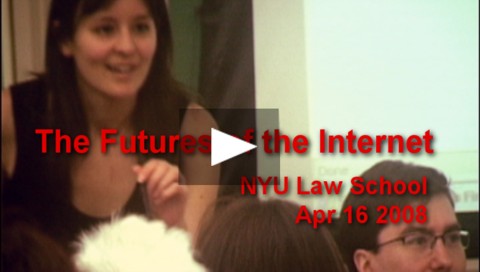Lots of good quality discussion on the question of the Future (or Futures) of the Internet. There’s the upcoming conference to celebrate the 10th year of the founding of the Berkman Center, which is titled “The Future of the Internet.”
There’s Jonathan Zittrain‘s new book, The Future of the Internet — And How to Stop It. (In addition to buying a print copy, you can download the pdf version under creative commons license). Presenting on that book, there’s video of Zittrain at Princeton on March 26th, at ISOC-NY on April 11th, and at the Berkman Center the following week. You can also read and comment on the book.
Finally, via Biella Coleman I found this fascinating video from an event April 16th (between the above two videos), from a meeting of the NY Chapter of the Internet Society, talking about “The Futures of the Internet.” The discussion was sponsored by the NYU Information Law Institute, Free Culture @ NYU, and ISOC-NY. (Shirky’s presentation is on the same cognitive surplus theme from his web 2.0 expo keynote I recently blogged about).
- Clay Shirky, Author: Here Comes Everybody: The Power of Organizing Without Organizations, Adjunct Professor, NYU ITP
- Tim Wu, Author: Who Controls The Internet?, Professor, Columbia Law School
- Lauren Cornell, Executive Director, Rhizome
- Jimmy Wales, Founder, Wikipedia and Wikia
- Jonathan Zittrain, Author: The Future of the Internet – and How to Stop It, Professor, Oxford University; Visiting Professor, NYU Law,
It’s a lengthy video (1 hour 30 minutes), so I recommend downloading a version and getting comfortable to watch it. But if you’re interested in generativity, free culture, online communities, geek culture, mass collaboration, and the larger questions of the internet-as-public-sphere, it’s well worth it.
Once you’ve watched it, go read Biella’s blog post which raises the question she also asked in the video about the depth of political consciousness in “geek culture” generally and free software communities like Debian in particular, as well as the comment thread following it.
I can’t help but relate the discussion also to ROFLCon, and what I perceived as an unfortunate lack of critical and political framing to the discussion there (with some notable exceptions). Don’t get me wrong – I’m a huge fan of LOLCats and potentially subversive power of humor. But what kind of culture do we hope we’re collectively creating on the ‘net?
One attraction of the internet can be how unlike the offline world it is – but as the line between online communities and “real world” communities blurs (as more and more offline groups and communities become digitally enabled, and more and more online communities develop offline manifestations) do we risk losing the generative freedom the internet has made possible in the last decade?
As we move in the direction of cloud-based and hosted computing platforms like Google App Engine, Amazon EC2, or even the Facebook API and Open Social, do we put at risk the basic freedoms the FSF is organized to fight in support of?
There’s a quote often attributed to Abraham Lincoln that the best way to predict the future is to create it – so what are we collectively doing to create the future of the internet that preserves its progressive and liberational aspects?

1 Comment
Comments are closed.